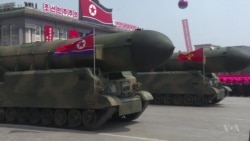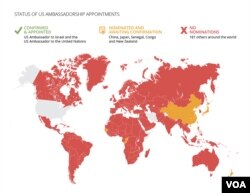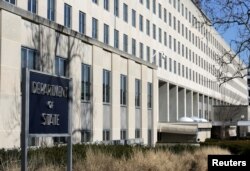With U.S. President Donald Trump facing challenges overseas in Syria and North Korea, as well as growing tensions with Russia, the public face of his his administration remains largely unknown, with hundreds of top U.S. diplomatic positions still unfilled.
So far, only two new U.S. ambassadors have been confirmed — to Israel and the United Nations.
More than three months into his presidency, Trump has nominated others for China, New Zealand, Japan, Congo and Senegal. He has not yet nominated anyone for 181 out of a total of 188 U.S. ambassadorships.
In the first four months of his presidency, Barack Obama had nominated eight ambassadors (including country and ambassador designations such as the United Nations), George W. Bush had nominated three, Bill Clinton 15 and George H.W. Bush 14, according to the nonpartisan, nonprofit Center for Presidential Transition.
Tuesday, the nominee to be the next U.S. ambassador to China, Iowa Governor Terry Branstad, will appear in front of the Senate Foreign Relations Committee for his first nomination hearing.
But as tensions on the Korean Peninsula rise, Trump has not yet nominated a U.S. ambassador to South Korea or an assistant secretary of state for East Asian and Pacific Affairs. Ambassadors are normally political appointees and are traditionally replaced under each new administration.
The Brookings Institution's Thomas Wright calls this level of unfilled senior positions unprecedented and worrisome.
"If you take, for instance, the recent summit with President Xi Jinping of China, there were very few Asia experts appointed to senior positions," Wright said. "Those people normally would be crucial in guiding that summit along. And so this, I think, is having a damaging effect on an ongoing basis."
Acting State Department spokesman Mark Toner sought to quell concerns at a recent briefing.
"I can assure everyone in this room and everyone in the United States and around the world that these are not vacancies, that there are senior State Department officials serving in acting capacities, but these folks are seasoned veterans of the Foreign Service and seasoned diplomats," Toner said when questioned by VOA.
The acting spokesman and career diplomat said appointing new ambassadors and assistant secretaries of state always takes time under every new administration.
But why is this administration having more problems filling top positions than previous ones?
Retired U.S. Ambassador Ron Neumann told VOA it may have something to do with Trump's vetting team.
"There is a very small group in the White House that is controlling a lot of things, and there are some tensions within that group," Neumann said. "But in addition to that, it [the group] is just small. So it's perfectly possible that a large part of the delay is simply that those making the decisions are totally overloaded."
Neumann, now president of the American Academy of Diplomacy, noted that when it comes to top foreign policy positions within the State Department, there may be other considerations.
"I think there's an additional feature, which is that Secretary [of State Rex] Tillerson wants to finish his review of how to restructure the State Department before he fills a lot of jobs, some of which might be eliminated. And there's a certain logic to that, but the price may be too high if it goes on too long," the former ambassador noted.
In an unusual interview with The New York Times released Thursday, Tillerson's spokesman, R.C. Hammond, confirmed this, saying there was no sense nominating candidates for jobs that may eventually be cut.
"The first step was to find out where the Titanic was, and then it was to map out where everything else is," Hammond told the newspaper.
The Trump administration has proposed cutting the State Department's budget by close to 30 percent. Congressional leaders from both major political parties have said they will not approve such cuts.
Political factors
Wright says he believes there are also political factors behind the lack of nominations.
"Particularly, some people around Trump are intent on vengeance against people who opposed him in the campaign. And so they've ruled out any Republicans who criticized or opposed Trump during the election," the Brookings Institution fellow said. "But they have virtually nobody who is qualified for senior Senate-confirmable positions, or very few people who actually supported him — and so we have a bit of a standoff."
Council on Foreign Relations President Richard Haass said the most "natural pool of talent on the Republican side" has been precluded from consideration because many signed open letters criticizing then-candidate Trump during the campaign.
"And my own recommendation — and I made this point publicly and privately — is these individuals ought to receive the equivalent of a pardon. That the president, if he wants to succeed, needs to be able to a call upon the best and the brightest, the most talented Americans," Haass said.












